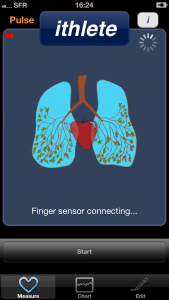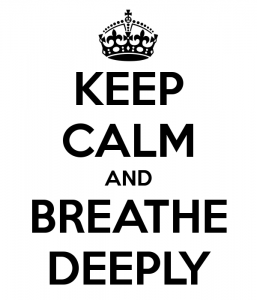Breathing and heart rate are intrinsically linked
 Heart rate (HR) varies with breathing, as you breathe in HR speeds up, as you breathe out HR slows. This is known as Respiratory Sinus Arrhythmia (RSA for short). This is also why deep/slow breathing is linked with many relaxation methods.
Heart rate (HR) varies with breathing, as you breathe in HR speeds up, as you breathe out HR slows. This is known as Respiratory Sinus Arrhythmia (RSA for short). This is also why deep/slow breathing is linked with many relaxation methods.
Interestingly it is thought that the evolutionary origin of RSA is when mammals lived in water, they came up for air for a short time and had to absorb as much oxygen as possible during that time, then when diving, they needed the HR to slow right down to conserve resources.
RSA is due largely to the parasympathetic nervous system and in very fit people can be an almost 2:1 ratio between inhaling and exhaling. So for example your average HR might be 60, but when inhaling it goes as high as 80 and as low as 40 when exhaling. Quite a dramatic change.
Why does ithlete use paced breathing?
 As HR speeds up when you inhale and slows when you exhale the time gap between beats (HRV) and breathing are intimately connected.
As HR speeds up when you inhale and slows when you exhale the time gap between beats (HRV) and breathing are intimately connected.
We often tell our users consistency is key to getting a good ithlete heart rate variability (HRV) measurement, and the paced breathing element of the reading is a huge part of this. We are aiming to get a snapshot of the autonomic nervous system (ANS) under the same conditions every day and compare that to both the previous day, and to the baseline. The paced breathing stimulating your nervous in a consistent way also enables ithlete to use the short 1 minute measurement.
The following quote from Dr Liz Miller, a former neurosurgeon, psychologist & author (and ithlete user!) explains this further…
“The emphasis is getting people to breathe right, which maximises HRV because breathing profoundly affects HRV – Heart Rate Variation is largely due to the changes that occur during breathing – breathe in – Heart Rate goes up – breathe out – Heart Rate goes down. These changes are healthy, normal and partly relate to the mechanics and partly to the autonomic (sympathetic and parasympathetic) nervous system. The greater the changes between breathing in and breathing out, the healthier and fitter your heart, lungs and autonomic system.
Inconsistent breathing, even slight, profoundly affects HRV. Although most people learn subliminally that to get their best reading, they need to follow the animation on the screen, and breathe in a slow and measured fashion, it is possible to mess with your HRV by fractionally altering your breathing. This will happen if you are anxious, tired or otherwise stressed.”
Choosing a comfortable breathing rate for you
 The breathing rate chosen for ithlete is based on extensive, and highly recommended, research into the effects of breathing rate on HRV. It is also intended to be comfortable for the widest range of users. The 55 second measurement is actually 7 complete breathing cycles.
The breathing rate chosen for ithlete is based on extensive, and highly recommended, research into the effects of breathing rate on HRV. It is also intended to be comfortable for the widest range of users. The 55 second measurement is actually 7 complete breathing cycles.
Later this week we’ll be looking in more depth at the research behind the breathing rate used in ithlete and current best practice recommendations.
Diaphragmatic breathing is the best way to complete your ithlete measurement. Not familiar with it? We really liked this introduction article.

I made a mask that opens and closes because when I inhale it takes about 5 seconds to take a full amount of air and to exhale it can last for 15-25 seconds , I find it really helps slow down my heart rate, I lived a careless life and my heart really races but when I put the mask on it really helps , dramatically, I wish I could expand on the mask by perfectly monitoring the amount of air pressure I inhale to get the heart rate I achieve and monitor the air pressure I release to get the heart rate I achieve , I wouldn’t comment about it unless it really made that big of a difference and the mask I speak of made a huge difference. When I inhale it is entirely open when I exhale I close it so the air releases from my nose at the 15-25 seconds
if the measurement stopped early, what is the problem??
The measurement stops early if more than 3 errors are detected during the 60s. These are most commonly caused by the sensor moving slightly, or if it has poor contact. Errors can also be caused if you breathe too deep. Gentle breathing in & out through the nose is OK.
Would detection of PVCs (premature ventricular contractions) cause detection of an error and make the measurement stop early? I woke up this morning with a bad case of PVCs and could not get ithlete to complete a measurement, even after trying 5 or 6 times.
Hi Alden,
Yes it would – it’s very important to eliminate PVCs and other arrhythmia from HRV calculations, and if ithlete detects >3 it will stop the measure.
Hope the explanation helps understanding, if not your condition.
Is it normal for a person who has ran or exercised (out of breath). To have a slower heart rate breathing in and a faster one exhaling?
Hi Angel. We specialise in resting measurements so this isn’t really our area of expertise, but due to the fact that when exercising your sympathetic nervous system is active (adrenaline), we would expect your heart rate to be high and constant, not varying with your breath. Hope this helps (a little!).
hi
I have noticed of late that my breathing is very irregular this has lead me to believe am now suffering from arrhythmia? Can my way of breathing caused this?
Hi Shirley. I think it’s unlikely that irregular breathing patterns could cause arrhythmia, but it may be that anxiety is a common underlying cause of both. If you are concerned about possible arrhythmia, the best thing is to get checked out at the Doctor’s.
best wishes,
Simon